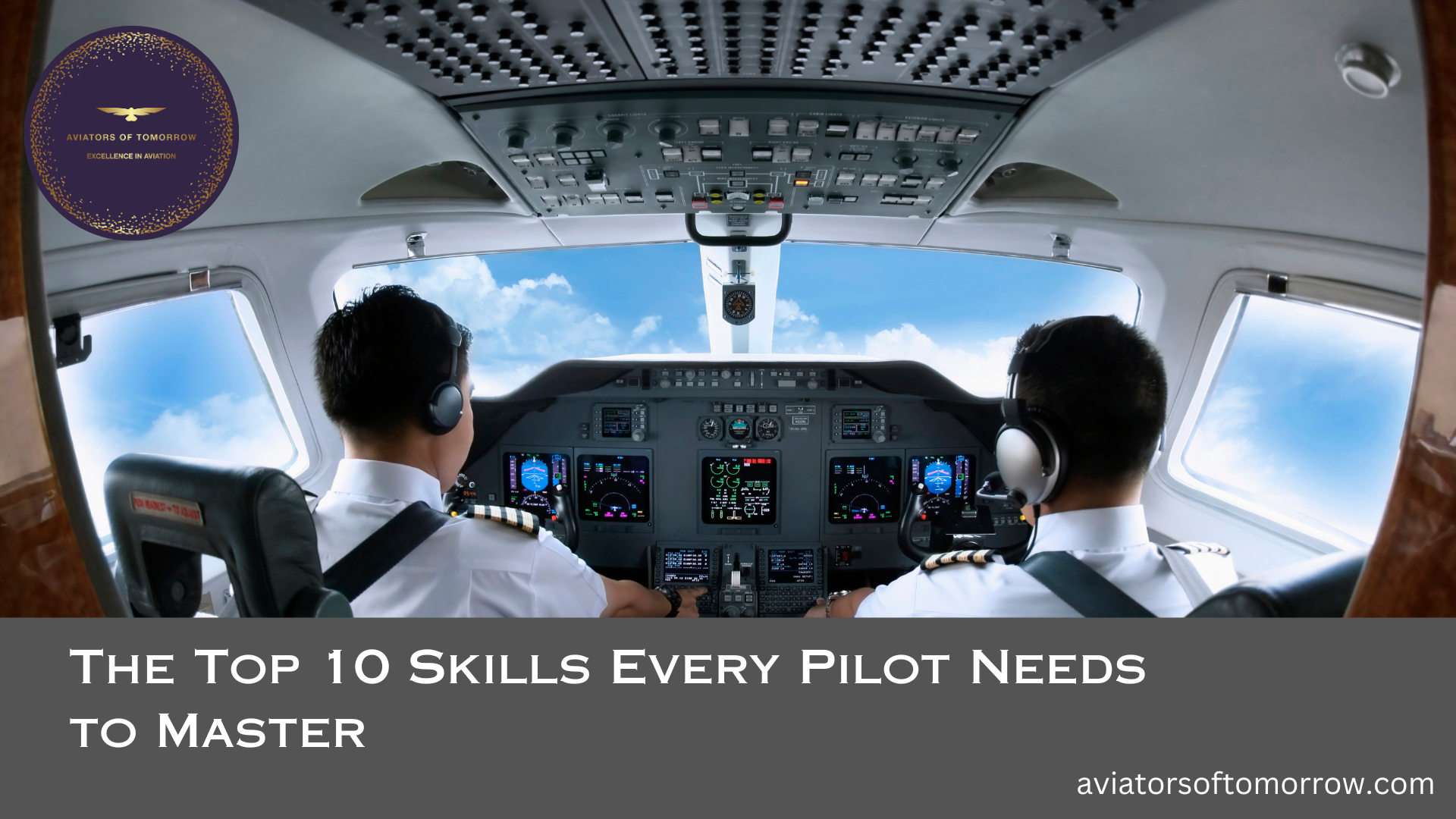The Top 10 Skills Every Pilot Needs to Master
Table of Contents
ToggleIntroduction
Flying an aircraft is a highly skilled profession that requires a unique set of abilities. The safe transportation of passengers and cargo is the responsibility of pilots, and they must possess a range of technical, cognitive, and interpersonal skills to excel in their role. In this blog, we will explore the top 10 skills that every pilot needs to master in order to ensure a successful and safe flight.
Technical Knowledge and Competence
As the foundation of a pilot’s skill set, technical knowledge is crucial. This includes understanding aircraft systems, aerodynamics, navigation, and meteorology. Pilots must also be adept at interpreting flight instruments and managing the aircraft’s controls. By continually expanding their technical knowledge and staying updated with the latest advancements, pilots can enhance their overall competence.
Situational Awareness
Situational awareness involves being fully aware of the aircraft’s position, the environment, and any potential hazards or changes in conditions. Pilots must continuously monitor the aircraft’s instruments, scan the surrounding airspace, and assess weather conditions. By maintaining a high level of situational awareness, pilots can make informed decisions and respond effectively to any unforeseen circumstances.
Decision-Making Skills
Pilots often face critical decisions during flights, and the ability to make quick and effective choices is essential. They must evaluate various factors such as weather conditions, aircraft performance, and passenger safety. By employing sound judgment and considering all available information; pilots can make decisions that prioritize the well-being of everyone on board.
Communication and Teamwork
Clear and effective communication is crucial for pilots to interact with air traffic control, cabin crew, and other team members. They must convey information accurately and concisely, especially during critical phases of flight. Additionally, pilots often work in a team environment, collaborating with co-pilots and cabin crew to ensure smooth operations. Strong interpersonal skills contribute to effective teamwork and a harmonious working environment.
Leadership Skills
In situations where pilots are the commanding authority on board, they must demonstrate leadership qualities. This involves taking charge during emergencies, providing clear instructions, and maintaining a calm and composed demeanour. Effective leadership instils confidence in the crew and passengers, fostering a sense of security and trust.
Problem-Solving Abilities
The aviation industry presents pilots with a variety of challenges, and the ability to think critically and solve problems is paramount. Pilots must analyze complex situations, identify potential risks, and implement appropriate solutions. Quick thinking and adaptability are key attributes that enable pilots to address unexpected circumstances and ensure the safety of their aircraft and passengers.
Emotional Intelligence
Emotional intelligence plays a crucial role in a pilot’s ability to manage stress, interact with others, and maintain composure in challenging situations. Pilots must remain calm under pressure, manage their emotions effectively, and make rational decisions. By developing emotional intelligence, pilots can enhance their overall performance and foster a positive atmosphere on board.
Attention to Detail
Attention to detail is essential for pilots to ensure the accuracy and precision of their actions. From conducting pre-flight inspections to monitoring instruments and systems throughout the flight, pilots must be meticulous in their approach. Pilots can detect and address potential issues early on by paying close attention to details, preventing them from escalating into more significant problems.
Physical and Mental Fitness
The demands of piloting an aircraft require pilots to be in good physical and mental shape. They must maintain adequate fitness levels,
including regular exercise and a healthy lifestyle. Mental fitness is equally important, as pilots need to stay focused and alert during long flights. Pilots can improve mental well-being by practising meditation or stress management.
Continuous Learning and Professional Development
Aviation is a dynamic field, and pilots must commit to lifelong learning and professional development. Staying updated with advancements in technology, regulations, and industry best practices is essential. Pilots should actively seek opportunities to enhance their knowledge and skills through training programs, workshops, and attending relevant conferences.
Read About:- Flying High: How to Make Aviation Your Career
Conclusion
Mastering the top 10 skills discussed in this article is crucial for any aspiring or seasoned pilot. Technical competence, situational awareness, decision-making skills, effective communication, and teamwork are just a few of the key abilities necessary for a successful aviation career. By continuously honing these skills and maintaining a commitment to excellence, pilots can navigate the skies with confidence and ensure the safety and satisfaction of their passengers.
FAQs
Pilot training time varies based on license type and personal dedication. On average, it can take around 1-2 years to obtain a private pilot license and several more years to progress to commercial licenses.
The minimum age to obtain a private pilot license is usually 17 years old in most countries. However, age requirements may vary for different types of licenses and certifications.
Becoming a pilot requires meeting certain medical and educational requirements, as well as obtaining the necessary licenses and certifications. However, with proper training and dedication, individuals with a passion for aviation can pursue a career as a pilot.
Pilots are required to undergo recurrent training and evaluations periodically to maintain their licenses and make sure they are always aware of the newest regulations and procedures. The frequency of training depends on the type of license and the airline’s policies.
Pilots face challenges such as adverse weather conditions, technical malfunctions, and dealing with emergencies. Additionally, they may experience long hours and irregular schedules, which can impact their work-life balance.
Author







